新外研版七年级上Modules7-8知识点总结
(完整word版)7外研版初一英语(上册)知识点归纳
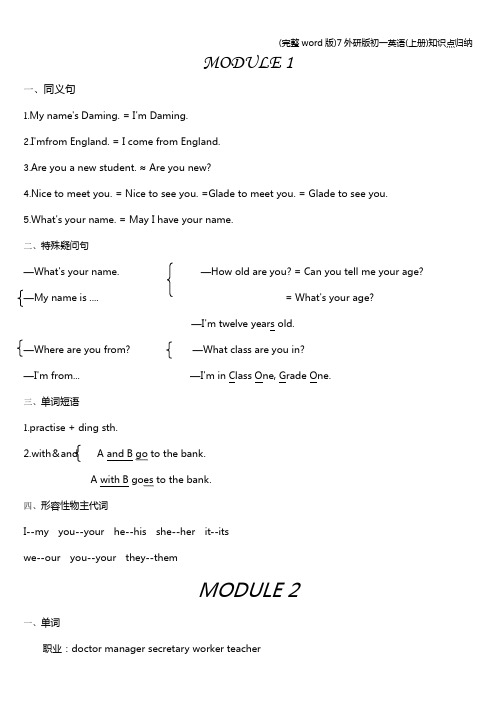
MODULE 1一、同义句1.My name's Daming. = I'm Daming.2.I'mfrom England. = I come from England.3.Are you a new student. ≈ Are you new?4.Nice to meet you. = Nice to see you. =Glade to meet you. = Glade to see you.5.What's your name. = May I have your name.二、特殊疑问句—What's your name. —How old are you? = Can you tell me your age?—My name is .... = What's your age?—I'm twelve years old.—Where are you from? —What class are you in?—I'm from... —I'm in Class One, Grade One.三、单词短语1.practise + ding sth.2.with&and A and B go to the bank.A withB goes to the bank.四、形容性物主代词I--my you--your he--his she--her it--itswe--our you--your they--themMODULE 2一、单词职业:doctor manager secretary worker teacher工作地点:factory hospital hotel office school university二、短语a photo\picture of my family三、语法(can)Can do sth.I can\can't ride a bike.Can you ride a bike?Yes, I can.\No, I can't.四、句子What does your ... do?=What is\are you ...'s job?=What is your ...?He\She is a ... They're ...MODULE 3一、单词1.building in school: classroom dining hall gym library office science lab2.something: blackboard book classroom computer desk dictionary footballlibrary picture television3.numbers: thirteen fourteen fifteen sixteen seventeen eighteen nineteenthirty forty fifty sixty seventy eighty ninety4.介词:next to ≈ near behind ≠ in front of in on under5.in front of:在......前面in the front of:在......里面的前面 6.right 正确的≠wrong右边的≠left二、语音 er 、or 、ur 发/ə/ 三、语法(There be)----Are there any school offices?----Is there a computer on Miss Li's desk? ----No, there isn't. 注意:1.就近原则:There is some meat and two apple on the desk. 2.名词所有格: Miss Li's herLily and Lucy's 两人共有的 eg: Lily and Lucy's father. Lily's and Lucy's 两人各有的 Lily's and Lucy's fathers.MODULE 4一、family members:aunt uncle grandma grandmother grandpa grandfather mother father mum dad sister brother二、短语句型Thank you forhelping me.asking me.inviting me. Make a family tree for your family.----How many people are there in your family?----There are four. There are my mum and dad, my sister and me.----Have you got an aunt?/any .....?----Yes,I have./No,I haven't.----Have you got a small family or a big family?----I've got a big family.(选择疑问句)or的用法:① 或;② 并列否定:I don't like swimming or dancing.MODULE 5-6一、单词1. orange 橙汁have some orange[U]橙色the oranges are orange[C]橙子This is an orange[C]2.Kind 善良He is very kind.种类=tyre a kind / type of fruit two kinds /types of fruits 3.gym: 不受天气影响的室内体育馆、健身房或运动馆stadium: 周围有看台的露天大型运动场4.healthy ≠ unhealthy keep/stay healthyin good health ≠ in poor/bad healthbe healthy = be in health5.good for one health ≠ bad for one health二、短语see a film / see films = go to the cinemaMODULE 7一、短语about sth.谈论某事talk to sb.get up≠go to bedgo home≠leave home(for)study science/history/chemistry/maths/...二、语法①时间表达法:____ What's the time? What time it is?直 读 法 : It's two ten. (2:10)a cup of tea a glass of water a can of coke a bottle of juice a bowl of rice a piece of meat(当物为代词时,只能 用to 或for 的句型)____ 逆 读 法 : ①It's ten past two.(2:10) ≤30' ②It's ten to ten. (2:50) >30' 整点表达法:It's two o'clock. (2:00)(不用介词)【No. 1】一般现在时的功能1.表示事物或人物的特征、状态。
外研版七年级上册Module 7知识点整理

外研版七年级上册Module 7知识点整理1. primary school 小学2. the name of ………的名字3. be born 出生于4. in England 在英格兰5. in Shanxi Province 在山西省6. quite difficult 非常难管7. on the east coast of America 在美国东海岸8. twelve years ago 12年前9. lots of things to do 许多事情要做10. last year 去年11. last weekend 上周末12. from…to…从…到…重点句子1. Where were you born? 你在哪里出生?2 I was born in…我出生在……3 What was the name of the village? 那个村庄叫什么?4 What was the name of your first school?你上的第一所学校叫什么名字?5 Who was your first teacher? 你的第一位老师是谁?6 She was very friendly.她非常友好。
7 Who were your first friends?你最早的朋友是谁呢?8 He was quite difficult. 他很难管。
9 What were they like? 他们当时是怎样的?10 What were you like? 你当时是怎样的?11 There were lots of things to do in Quincy.在昆西有很多事情可以做。
12 I was very happy there.我在那里非常快乐。
13 There was a big living room with a TV, a kitchen, a bathroom and three bedrooms. 我们的房子又大又舒服,有一间大的起居室,里面有一台电视机,还有一间厨房,一个卫生间和三间卧室。
七年级英语(上册)(外研版)Module8Choosingpresents知识点总结
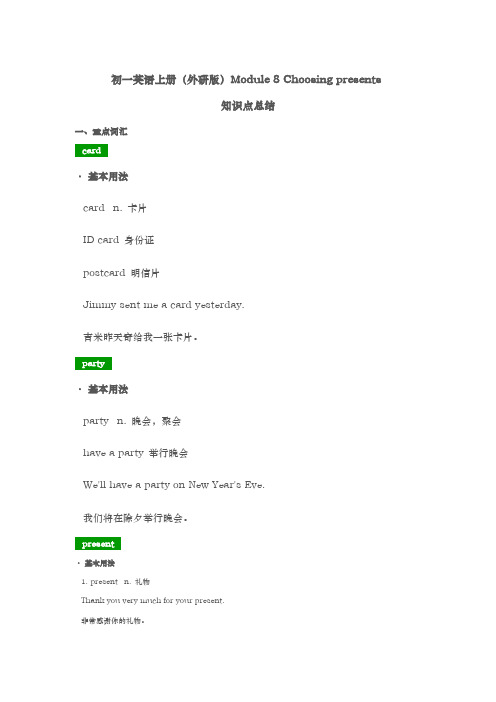
初一英语上册(外研版)Module 8 Choosing presents知识点总结一、重点词汇·基本用法card n. 卡片ID card 身份证postcard 明信片Jimmy sent me a card yesterday.吉米昨天寄给我一张卡片。
·基本用法party n. 晚会,聚会have a party 举行晚会We'll have a party on New Year's Eve.我们将在除夕举行晚会。
·基本用法1. present n. 礼物Thank you very much for your present.非常感谢你的礼物。
2. present adj. 出席的,在场的All the people present at the meeting agree to the plan.所有到会的人都同意这个计划。
·原文再现I always like birthday parties.我总是喜欢生日聚会。
·基本用法always adv. 总是,一直,通常位于行为动词之前,be动词或情态动词之后。
I always get everything ready before going out.我总是在出去之前把一切准备好。
She's always late for everything.她事事都迟到。
·知识拓展--相关单词用来表示频率的副词还有:usually 通常地often 经常地seldom 很少hardly 几乎不sometimes 有时never 从不·原文再现Great!太棒了!·基本用法great adj. 太好了,巨大的,很棒的What a great idea!好主意!This cake tastes great.这块蛋糕吃起来很不错。
·原文再现And we eat birthday cake too.并且我们也吃生日蛋糕。
外研版七年级上册知识梳理与复习(Modules_7-8)
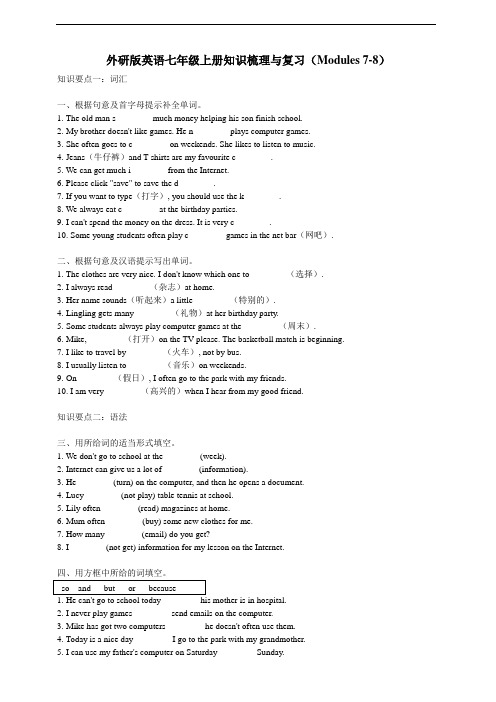
外研版英语七年级上册知识梳理与复习(Modules 7-8)知识要点一:词汇一、根据句意及首字母提示补全单词。
1. The old man s________ much money helping his son finish school.2. My brother doesn't like games. He n________ plays computer games.3. She often goes to c________ on weekends. She likes to listen to music.4. Jeans(牛仔裤)and T-shirts are my favourite c________.5. We can get much i________ from the Internet.6. Please click "save" to save the d________.7. If you want to type(打字), you should use the k________.8. We always eat c________ at the birthday parties.9. I can't spend the money on the dress. It is very c________.10. Some young students often play c________ games in the net bar(网吧).二、根据句意及汉语提示写出单词。
1. The clothes are very nice. I don't know which one to ________(选择).2. I always read ________(杂志)at home.3. Her name sounds(听起来)a little ________(特别的).4. Lingling gets many ________(礼物)at her birthday party.5. Some students always play computer games at the ________(周末).6. Mike, ________(打开)on the TV please. The basketball match is beginning.7. I like to travel by ________(火车), not by bus.8. I usually listen to ________(音乐)on weekends.9. On ________(假日), I often go to the park with my friends.10. I am very ________(高兴的)when I hear from my good friend.知识要点二:语法三、用所给词的适当形式填空。
外研版英语七年级上册Module7 单元必考知识点

Module7 模块必考知识点1. 【课本原句】Finally turn on the computer. 最后打开电脑。
【解析】turn on指的是“打开”电视、电脑、电灯等电器用品,它的的反义词组为turn off。
它们接宾语时,代词放在turn与on中间,名词一般放在on后面。
如:Could you turn on the light, please? / Could you turn it on, please? 请打开灯好吗?而open一般用于打开“门、窗”等,与close互为反义词。
如:Can you open the door for me? 你可以为我打开门吗?2. 【课本原句】How do I write my homework on the computer? 我怎样在电脑上写作业呢?【解析】这是一个由how引导的一般现在时的特殊疑问句。
how意为“如何;怎样”。
如:—How do you go to scho ol? 你怎样去上学?—I go to school by bike.我骑自行车去上学。
一般现在时的助动词是do 和does,do 用于主语是第一、二人称及第三人称复数的疑问句,does用于主语是第三人称单数的疑问句。
3. 【课本原句】But sometimes I play a lot of games. 但有时我玩很多游戏。
【解析】but是并列连词,用来连接两个简单句,构成并列句,表示转折。
如:I like wat ching TV, but he like s playing computer games. 我喜欢看电视,但是他喜欢玩电脑游戏。
sometimes为频度副词,意为“有时”,相当于at times,常位于系动词之后、行为动词之前。
如:She sometimes walks to school. 她有时步行去上学。
【拓展】“some”与“time”面面观在英语学习中,大家经常会见到some与time组合以及它们的不同搭配。
外研版初一英语上册Module-8-知识点讲义

外研版初一英语上册M o d u l e-8-知识点讲义-CAL-FENGHAI.-(YICAI)-Company One1Module 8. Choosing presents一、主题:个人喜好(Personal preference)二、必背单词名词:card卡片 party晚会、聚会 present礼物 cake蛋糕 secret秘密 CD 激光唱片;光盘 concert音乐会 magazine杂志 scarf围巾 silk丝绸 dress 连衣裙;礼服 T-shirt T恤衫 exercise锻炼;练习 shoe鞋;鞋子 money 钱;金钱 film电影 song歌曲 match(尤指体育方面的)比赛;竞赛weekend周末动词:would v.aux. 肯,会;愿意 cut切;剪 give 给;送 sing唱,唱歌choose选择;挑选 wear穿;戴 spend花(钱);花费 hear听见形容词:great 太好了;巨大的;超乎寻常的 special特别的,特殊的 happy 高兴的;幸福的 expensive昂贵的 dear(用于信开头某人的名字前)亲爱的afraid担心的;害怕的副词:always 总是;一直 never从不三、常用短语• 1. have a birthday party for sb 为某人举行生日派对• 2. go to one’s birthday party 去参加某人的生日派对• 3. at a Chinese birthday party 在中国人的生日聚会上• 4. at the birthday dinner 在生日宴会上• 5. make a birthday cake for sb 为某人制作生日蛋糕• 6. give/send birthday cards 送生日贺片•7. get birthday presents 收到生日礼物•8. on one’s birthday 在某人的生日(那天)•9. a box of chocolates 一盒巧克力•10. a cinema ticket 一张电影票• a concert ticket 一张音乐会票•11. choose a birthday present for... 为......选择生日礼物•12. stay/keep healthy 保持健康•13. get some exercise 进行体育锻炼•14. every day 每天•15. eleven silk scarves 11条丝绸围巾•16. sb spend +时间/钱+on sth 在某物上花费时间 / 钱•sb spend +时间/钱+(in) doing sth 在做某事上花费时间 / 钱•17. read magazines 阅读杂志•18. go to the cinema 去看电影•19. watch sports 观看体育赛事•20. go to concerts 去听音乐会•21. the CDs of one’s favourite songs 某人最喜爱的歌曲的唱片•22. go to the football match 去看足球赛•23. watch football matches on TV 在电视里看足球比赛•24. at weekends = at the weekend 在周末•25. watch AC Milan 看AC米兰(的比赛)•26. watch films看电影•27. stay at home待在家里•28. on Saturday evening在星期六晚上•29. hear from sb 收到某人的来信•30. watch sb play football 观看某人踢足球四.模块语法• 1.表频度的词如often,usually,always,never等在一般现在时句子中的位置。
外研版(2012新版)七年级上册英语 module7~module8知识点

七年级module7-module8主要知识点主要单词(module以下简写为M,M7指代module7)M7:键盘__________鼠标;老鼠__________复数_______屏幕_________连接___________ 转动________学,学会________文件____________点击_________使用_____保存,挽救________ 框;盒子______最后__________打印__________纸________顾客___________澳大利亚____________澳大利亚的____________游戏_______分享________公司;剧团___________经常_________ 因特网____________检查;查看_________火车_________旅行___________计划_________ 票_________音乐__________电影__________搜寻;搜索_________信息_____________(不可数名词)电子邮件________发送________有时候;不时__________参观,探望_________假日;节日___________M8:卡片_______晚会,聚会________礼物_________总是;一直________太好了;巨大的_________蛋糕________从不__________特别的__________切;剪_______给,送________ 高兴的;幸福的__________秘密___________电影院__________音乐会__________杂志___________围巾,头巾__________复数_________丝绸_______衬衫________T恤衫_________ 选择,挑选__________锻炼,练习_________穿,戴_______昂贵的__________衣服(总称)__________鞋,鞋子_______花(钱);花费_________钱_________电影________歌曲________比赛,竞赛________周末___________亲爱的_________听见_________担心的,害怕的__________主要短语M7:turn on 打开on the computer在计算机/因特网上save the document 保存文件write my homework写我的家庭作业print my document打印我的文件on the Internet在网上travel plans旅行计划search for information查找信息of course 当然turn off 关闭every day 每天write to 写信给……connect……to……把…连接到……上 a box of 一盒…… talk with/to…和…交谈go on the Internet 上网listen to 听… do one’s homework做作业play computer games玩电脑游戏one and a half times 1.5倍learn (to do)sth.学习(做)某事plan +to do sth 计划做某事make a plan 订计划send sb sth =send sth. to sb 给某人发送某物share sth with sb 与某人共享……;与某人分担某事save one’s life 救某人的性命summer holiday 暑假take a holiday 休假M8:birthday party 生日聚会at the birthday dinner 在生日晚宴上at the birthday party 在生日聚会上birthday cake 生日蛋糕birthday card 生日卡片in English用英语birthday present 生日礼物Teachers’ Day教师节get some exercise锻炼go shopping去购物go to the cinema 去看电影go to concerts 去听音乐会football match足球赛at weekends在周末at once立刻,马上hear from收到…的来信make a cake 制作蛋糕 a cinema/concert ticket一张电影/音乐会票on Saturday evening 在周六晚上would like sth想要某物would like to do sth.想做某事give sb sth=give sth to sb 给某人某物sb spend(s)+some time/money+on sth 某人在某事上花费时间/金钱sb spend(s)+some time/money+(in) doing sth某人做某事花费时间/金钱watch sb do sth 观看某人做某事watch sb doing sth 观看某人正在做某事be afraid of sb/sth害怕某人/某物be afraid of doing sth 害怕做某事主要句型M7:1.How do I write my homework on the computer?我怎样在电脑上写作业呢?2.First,open a new document.首先,打开一个新文件。
外研社七7-8知识点总结

七年级上英语知识点归纳Module 71.时间表达法:1)询问时间What time is it? /What’s the time?①整点:用数字表示,或加上o’clock 如:at ten , at ten o’clock②半点:用half + past表示eg: half past ten, half past five, half past twelve③<30’ : 用介词past:分钟+past+钟点eg: 9:05 :five past nine 6:20 twenty past six④>30’: 用介词to, 分钟(60-所给分钟数)+ to+(所给钟点+1) 2:50 ten to three⑤分钟是“15”或“45”,通常用a quarter(一刻钟)eg: 4:15 a quarter past four9:45 a quarter to ten2) 询问星期几:What day is it today? It’s Tuesday. (it 指代时间,天气或距离)3) 询问日期:What’s the date today? It’s June 1st .2. 介词in, on, at 的用法:in +时间段( 年、季节、月份和早午晚)e.g. in 1999, in July/May…, in the morning/afternoon/ evening, in spring/ summer/autumn/ winteron+具体某一天,或早上、下午、晚上前有定语(如表示天气的词)e.g on Monday…, on December 24, on a cold morning…at+钟点时间at 9 o’clock3. We have Chinese at eight o’clok. 表示上什么课不用the .eg: have chemistry/ have English /have maths /have history/ have music/ have art/ have P.E./ have science4. What about /How about + doing sth …怎么样?(表示征求意见)5. 有用的短语get up / go home /have breakfast / have lunch / have dinner/next to/have a break / talk to(with) / do one’s homework/ go to bedModule81. 一般现在时:频率副词的用法,放在行为动词前,主语或be动词后always总是>usually通常>often经常>sometimes有时>seldom很少>never从不(程度依次减弱)seldom/never表否定eg: He never/seldom sings or dances.1.send sb sth = send sth to sbgive sb sth = give sth to sb make sth for sb =make sb sthchoose sth for sb= choose sb sth buy sth for sb=buy sb stheg: We send him a card.= We send a card to him.I make a cake for her. = I make her a cake.3. a concert ticket / two concert ticket s4. a pair of jeans/ two pairs of jeans 一/两条牛仔裤类似的单词还有:shoes, glasses , gloves , shorts, scissors, chopsticks, trainers 数词+ pair(s) of +名词5.许多:lots of = a lot of (多用于肯定),many+复n , much+不可n (多用于否定) eg: There isn’t much milk in the bottle. / There is a lot of money in his pocket.询问:How much milk is there in the bottle? (直接问有多少牛奶)How many bottles of milk are there? (问有多少瓶牛奶,瓶是可数)6.She buys CDs by her favourite singers. by:表示“由……,被……”eg: I like the songs by Liu Dehua. 我喜欢刘德华的歌。
外研社 七年级英语上册 Module 8 知识点总结

Module 8 Story time1、once upon a time 从前,很久以前相当于 long long ago, 常用于讲故事的开头。
Once upon a time, there was a king.Once adv. 曾经,一度,一次 We once lived in Shanghai. once a month 一个月一次 2、decode (not) to do sth. 决定(不)做某事 They decided not to tell Tom about it. decide + that从句 She has decided that she will be a doctor in the future. Decide的名词形式→ decision make a decision 做决定 She has made a decision to become a doctor.3、go for a walk go on a walk have a walk take a walk 去散步4、be / get lost 迷路 I am always lost in big cities.Lost adj. 丢失的,失去的;错过的,浪费掉的,Try to find the lost key.5、look around 向四周看 She looked around her but she saw nothing.6、notice v. 注意到,看到(感官动词) I noticed he left very early. 我注意到他走得早。
notice sb. do sth. I noticed her crying in the room. (正在哭)notice sb. doing sth. I noticed her cry in the room. (哭了)7、knock on /at the door 敲门 knock into 撞上 again and again 一次又一次 knock v. 敲,撞,碰He knocked his head against the door.8、enter = go/come into 进入 He entered high school. 我上了高中。
外研版英语七年级上册Module 8知识点归纳
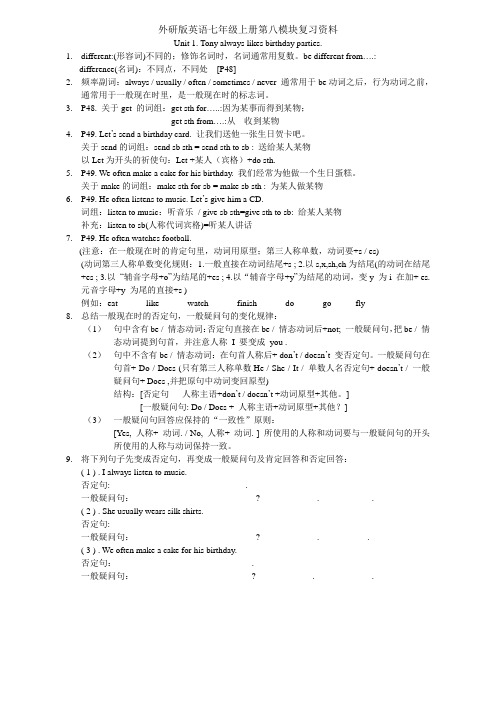
外研版英语七年级上册第八模块复习资料Unit 1. Tony always likes birthday parties.1.different:(形容词)不同的;修饰名词时,名词通常用复数。
be different from….:difference(名词):不同点,不同处[P48]2.频率副词:always / usually / often / sometimes / never 通常用于be动词之后,行为动词之前,通常用于一般现在时里,是一般现在时的标志词。
3.P48. 关于get 的词组:get sth for…..:因为某事而得到某物;get sth from….:从---收到某物4.P49. Let’s send a birthday card. 让我们送他一张生日贺卡吧。
关于send的词组:send sb sth = send sth to sb : 送给某人某物以Let为开头的祈使句:Let +某人(宾格)+do sth.5.P49. We often make a cake for his birthday. 我们经常为他做一个生日蛋糕。
关于make的词组:make sth for sb = make sb sth : 为某人做某物6.P49. He often listens to music. Let’s give him a CD.词组:listen to music:听音乐/ give sb sth=give sth to sb: 给某人某物补充:listen to sb(人称代词宾格)=听某人讲话7.P49. He often watches football.(注意:在一般现在时的肯定句里,动词用原型;第三人称单数,动词要+s / es)(动词第三人称单数变化规则:1.一般直接在动词结尾+s ; 2.以s,x,sh,ch为结尾(的动词在结尾+es ; 3.以“辅音字母+o”为结尾的+es ; 4.以“辅音字母+y”为结尾的动词,变y 为i 在加+ es.元音字母+y 为尾的直接+s )例如:eat______ like______ watch______ finish ______do______ go_____ fly__8.总结一般现在时的否定句,一般疑问句的变化规律:(1)句中含有be / 情态动词:否定句直接在be / 情态动词后+not; 一般疑问句,把be / 情态动词提到句首,并注意人称I 要变成you .(2)句中不含有be / 情态动词:在句首人称后+ don’t / doesn’t 变否定句。
外研版七年级英语上册Module 8知识要点总结(无答案)
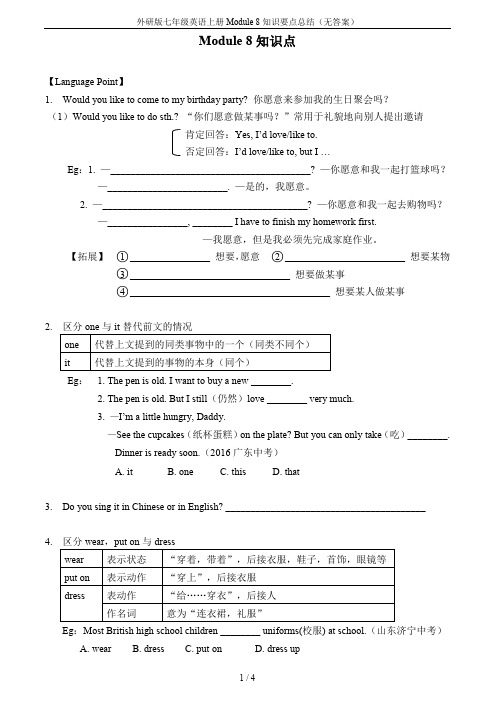
Module 8知识点【Language Point】1.Would you like to come to my birthday party? 你愿意来参加我的生日聚会吗?(1)Would you like to do sth.? “你们愿意做某事吗?”常用于礼貌地向别人提出邀请肯定回答:Yes, I’d love/like to.否定回答:I’d love/like to, but I …Eg:1. —________________________________________? —你愿意和我一起打篮球吗?—________________________. —是的,我愿意。
2. —_________________________________________? —你愿意和我一起去购物吗?—________________, ________ I have to finish my homework first.—我愿意,但是我必须先完成家庭作业。
【拓展】○1________________ 想要,愿意○2________________________ 想要某物○3________________________________ 想要做某事○4________________________________________ 想要某人做某事2.Eg: 1. The pen is old. I want to buy a new ________.2. The pen is old. But I still(仍然)love ________ very much.3. —I’m a little hungry, Daddy.—See the cupcakes(纸杯蛋糕)on the plate? But you can only take(吃)________.Dinner is ready soon.(2016广东中考)A. itB. oneC. thisD. that3.Do you sing it in Chinese or in English? ________________________________________4.Eg:Most British high school children ________ uniforms(校服) at school.(山东济宁中考)A. wearB. dressC. put onD. dress up5.spend ________(1)spend money/time on sth. 在某物上花费时间/金钱(2)spend money/time (in) doing sth 花费时间/金钱做某事eg:1. His brother ________ all his money ________ his studies.他哥哥把所有钱都花在了学业上。
外研版七年级上册Module_7_Computers_知识点总结

1. mouse n. 鼠标,其复数形式为mousesMy mouse is broken, so I need to get a new one. 我的鼠标坏了,得去买个新的。
2. mouse n. 老鼠,其复数形式为miceWhen the cat is away, the mice will play. [谚]猫儿不在,鼠儿成精。
基本用法connect vt. 连接(过去式:connected 过去分词:connected 现在分词:connecting 第三人称单数: connects)connect …with… 意为:把…和…连接在一起The living room connects with the toilet. 客厅与卫生间相连。
connect…to… 意为:把…连接到…How do you connect to the Internet?你怎样连网?turn on意为“打开”,多指打开电器(电视、电脑或收音机等)的开关,接通电源。
I want to turn on the television.·知识拓展--相关短语1. turn off 关掉/ Turn off the lights when you leave. 离开时把灯熄掉。
2. turn up 旋大,将音量调高Turn up the TV, I want to hear the news.把电视音量调高,我想听新闻。
3. turn down 旋小,将音量调低Turn down the radio, the baby is sleeping.把收音机调小,孩子在睡觉。
learn vi./vt. 学,学习(过去式:learned 过去分词:learned现在分词:learning 第三人称单数:learns)He is learning to play the piano. 他在学钢琴。
·知识拓展--相关句型/结构learn to do sth. 学习做某事You have to learn to take care of yourself. 你得学会保管好自己。
最新外研版七年级上M7-M8知识点总结.

新外研版七年级上M7-M8知识点总结.重点短语1.connect A to B 连接A到B,把A连接到B2.turn on / off... 打开/关闭(名中后,代中间)turn up / down.... 调高/调低......在电脑上写......4.open a new document 打开一个新文件5.click the mouse on...... 在......处点击鼠标6.in the new document 在新文件里7.save the document 保存文件8.write a name for the document 给文件取个名9.visit sb 拜访/看望某人10.print the document 打印文件11.put some paper in(the printer)把一些纸放入(打印机)12.on Sundays 在星期天13.share sth with sb 和某人分享某物,和某人共同使用某物14.in/at my home 在我家里一位公司的经理16.go on the Internet 上网17.check the times of trains 核查火车时刻表18.make travel plans 制作旅行计划plan to do sth 计划做某事19.listen to music 听音乐20.watch movies=watch a movie 看电影21.every Friday night 每个星期五晚上22.search for some information about... 搜索一些有关......的信息23.check one’s email查收电子邮件24.talk to sb on the Internet 在网络上和......谈话25.send emails to sb 发电子邮件给......打电子游戏2 为一家公司工作28.at/in the cinema 在电影院29.buy train tickets=buy a train ticket 买火车票30.remember to do sth 记住做某事(还没做)31.play music 播放音乐32.plan for our holiday 计划我们的假期e sth to do sth 使用……做…….重点句子我怎样在电脑上做家庭作业?2.What’s next?接下来是什么?请把显示器连接到主机.4.Finally 最后,打开电脑.5.I want to learn how to print a docu ment.我想学习怎样打印文件.我父亲经常在电脑上和他的客户洽谈.7.I also go on the Internet to check my emails.我也上网查看我的电子邮件.8.I listen to music or night .每星期五晚上我在电脑上听音乐或看电影.在我家里没有电脑.10.I play a lot of games and my mother doesn’t like it.我玩大量游戏,我母亲就会不高兴.(我玩大量游戏,我母亲不喜欢这件事.)基本语法点:1.一般现在时的特殊疑问句.注意问句的构成方式和常见的疑问词,请看专题练习.2.注意表达一系列动作的连接词:First...next...then...finally...Module 8重点短语:1.have a birthday party for sb 为某人举行生日派对2.go to one’s birthday party去参加某人的生日派对3.at a Chinese birthday party 在中国人的生日聚会上4.at the birthday dinner 在生日宴会上5.make a birthday cake for sb 为某人制作生日蛋糕6.give/send birthday cards 送生日贺片7.get birthday presents 收到生日礼物8.on one’s birthday在某人的生日(那天)9.a box of chocolates 一盒巧克力10.a cinema ticket 一张电影票a concert ticket 一张音乐会入场券11.choose a birthday present for... 为......选择生日礼物12.stay/keep healthy 保持健康13.get some exercise 进行体育锻炼14.every day 每天15.eleven silk scarves 11条丝绸围巾16.人 spend +时间/钱+on sth 在某物上花费时间 / 钱人 spend +时间/钱+(in) doing sth 在做某事上花费时间 / 钱17.read magazines=read a magazine 阅读杂志18.go to the cinema. 去看电影19.watch sports 观看体育赛事20.go to concerts=go to the concert 去听音乐会21.the CDs of one’s favourite songs某人最喜爱的歌曲的唱片22.go to the football match 去看足球赛23.watch football matches on TV 在电视里看足球比赛24.at weekends = at the weekend 在周末25.watch AC Milan 看AC米兰(的比赛)26.watch films=watch a film 看电影27.stay at home 待在家里28.on Saturday evening 在星期六晚上29.hear from sb 收到某人的来信30.watch sb play football 观看某人踢足球重点句子你愿意来参加我的生日派对吗?Yes, I’d love to./ I’d love to,but....\是的,我愿意./ 我很愿意,但是......2.My mother never makes a birthday cake for me.我母亲从不给我制作生日蛋糕.3.Do you sing it in Chinese or in English?你用中文还是英文唱这首歌呢?4.What would you like for your birthday?对于你的生日,你想要什么呢?5.It’s a secret. 这是秘密.6.What do you often do on Teachers’ Day?在教师节你常做什么呢?7.She spends lots of money on clothes.她在衣服上花费了大量的钱.8.We usually watch football on TV at weekends.在周末我们常在电视里看足球赛.9.Which presents do you choose for your friends?你为你的朋友选择哪些礼物呢?10.It’s great to hear from you.收到你的来信真是太好了.11.I’m afraid I can’恐怕我不能来.12.I always watch my sister play football.我一直都在观看我的妹妹踢足球 .基本语法点:1.表频度的词如often, usually, always, never等在一般现在时句子中的位置.2.对频度副词的提问用how often。
外研版初一英语上册Module 7 知识点讲义

Module 7. Computers一、主题:使用因特网(Using the internet)二、必背单词名词:keyboard键盘mouse鼠标;老鼠screen屏幕document文件box(计算机屏幕上的)框;盒子paper纸Australia澳大利亚company公司;剧团customer顾客Internet因特网train火车travel旅行ticket票music音乐movie电影night夜晚information信息email电子邮件game游戏cinema电影院clothes衣服(总称)holiday假日;节日动词:connect连接turn转动learn学;学习click点击use使用save保存;储存print 打印share共用;分享check检查;查看search搜寻;搜索;查找send发送visit探望;参观副词:finally最后often经常sometimes有时候;不时兼类词:plan n.计划v.计划;打算三、常用短语1、connect…to… 把………连接到…… connect A to B 连接A到B,把A连接到B2、turn on / off... 打开/关闭..... turn up / down.... 调高/调低......3、write sth on the computer 在电脑上写......4、open a new document 打开一个新文件in the new document在新文件里save the document 保存文件print my document打印我的文件5、write a name for sth. 为……命名write a name for the document 给文件取个名6、of course 当然7、visit sb 拜访/看望某人8、put some paper in the printer放一些纸在打印机里9、on Sundays 在星期天10、share sth. with sb. 和某人分享某物,和某人共同使用某物11、in my home 在我家里at home在家at school 在学校in my school 在我的学校12、a manager of a company 一位公司的经理work for a company 为一家公司工作13、go on the Internet 上网14、check the times of trains 核查火车时刻表15、make travel plans 制作旅行计划16、listen to music 听音乐watch movies看电影17、every Friday night每个星期五晚上18、search for搜寻;查找search for some information about... 搜索一些有关......的信息19、check one’s email 查收电子邮件20、talk to sb on the Internet 在网络上和......谈话21、send emails to sb 发电子邮件给......22、play computer games 打电子游戏23、remember to do sth 记住做某事(还没做)24、play music播放音乐25、plan for our holiday计划我们的假期26、use A to do B 使用A做B27、do one’s homework 做作业do one’s housework做家务28、a lot of=lots of =many =plenty of 许多,大量29、like doing sth. 喜欢做某事30、write to… 给……写信/电子邮件hear form… 收到……的信/电子邮件31、after school 放学后32、one and a half times 1.5倍四、重点句型1、祈使句型:(1)Click the mouse on “new document”.(2)Use the keyboard.2、行为动词的一般现在时的特殊疑问句:(1)How do I write my homework on the computer?(2)Where do you write its name ?(3)Who shares a computer with his father?3、there be句型:There is a computer in my home.五.模块语法行为动词的一般现在时(3)(When do you use a computer?Where do you save your homework?)注意表达一系列动作的连接词:First...next...then...finally...六、重要句子• 1. How do I do my homework on the computer? 我怎样在电脑上做家庭作业?• 2. What’s next? 接下来是什么?• 3. Please connect the screen to the computer. 请把显示器连接到主机。
新外研版七年级上M7-M8知识点总结.

新外研版七年级上M7-M8知识点总结.work Information Technology Company.2020YEARModule7重点短语1.connect A to B 连接A到B,把A连接到B2.turn on / off... 打开/关闭(名中后,代中间)turn up / down.... 调高/调低......3.write sth on the computer 在电脑上写......4.open a new document 打开一个新文件5.click the mouse on...... 在......处点击鼠标6.in the new document 在新文件里7.save the document 保存文件8.write a name for the document 给文件取个名9.visit sb 拜访/看望某人10.print the document 打印文件11.put some paper in(the printer)把一些纸放入(打印机)12.on Sundays 在星期天13.share sth with sb 和某人分享某物,和某人共同使用某物14.in/at my home 在我家里15.a manager of a company 一位公司的经理16.go on the Internet 上网17.check the times of trains 核查火车时刻表18.make travel plans 制作旅行计划plan to do sth 计划做某事19.listen to music 听音乐20.watch movies=watch a movie 看电影21.every Friday night 每个星期五晚上22.search for some information about... 搜索一些有关......的信息23.check one’s email查收电子邮件24.talk to sb on the Internet 在网络上和......谈话25.send emails to sb 发电子邮件给......26.play computer games 打电子游戏27.work for a company 为一家公司工作28.at/in the cinema 在电影院29.buy train tickets=buy a train ticket 买火车票30.remember to do sth 记住做某事(还没做)31.play music 播放音乐32.plan for our holiday 计划我们的假期e sth to do sth 使用……做…….重点句子1.How do I do my homework on the computer?我怎样在电脑上做家庭作业?2.What’s next?接下来是什么?3.Please connect the screen t o the computer.请把显示器连接到主机。
新外研版七年级上册知识点整理-期末总复习必背
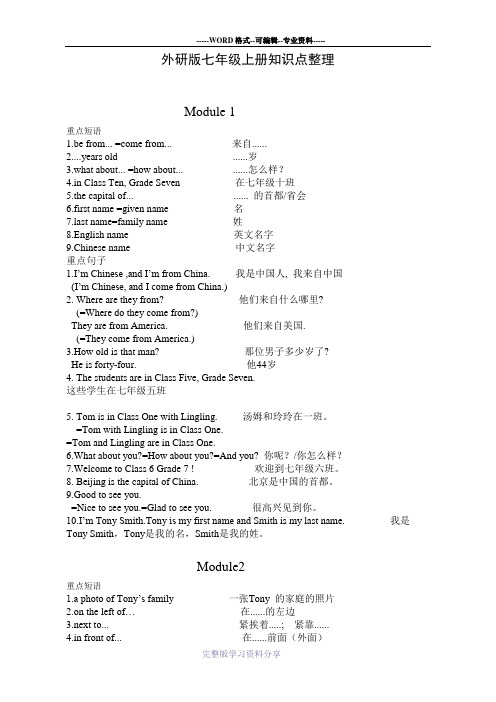
外研版七年级上册知识点整理Module 1重点短语1.be from... =come from... 来自......2....years old ......岁3.what about... =how about... ......怎么样?4.in Class Ten, Grade Seven 在七年级十班5.the capital of... ...... 的首都/省会6.first name =given name 名st name=family name 姓8.English name 英文名字9.Chinese name 中文名字重点句子1.I’m Chinese ,and I’m from China.我是中国人, 我来自中国(I’m Chinese, and I come fro m China.)2. Where are they from? 他们来自什么哪里?(=Where do they come from?)They are from America. 他们来自美国.(=They come from America.)3.How old is that man? 那位男子多少岁了?He is forty-four. 他44岁4. The students are in Class Five, Grade Seven.这些学生在七年级五班5. Tom is in Class One with Lingling. 汤姆和玲玲在一班。
=Tom with Lingling is in Class One.=Tom and Lingling are in Class One.6.What about you?=How about you?=And you? 你呢?/你怎么样?7.Welcome to Class 6 Grade 7 ! 欢迎到七年级六班。
8. Beijing is the capital of China. 北京是中国的首都。
- 1、下载文档前请自行甄别文档内容的完整性,平台不提供额外的编辑、内容补充、找答案等附加服务。
- 2、"仅部分预览"的文档,不可在线预览部分如存在完整性等问题,可反馈申请退款(可完整预览的文档不适用该条件!)。
- 3、如文档侵犯您的权益,请联系客服反馈,我们会尽快为您处理(人工客服工作时间:9:00-18:30)。
外研版七年级上册Module7
重点短语
1.connect A to B 连接A到B,把A连接到B
2.turn on / off... 打开/关闭(名中后,代中间)turn up / down.... 调高/调低......
3.write sth on the computer 在电脑上写......
4.open a new document 打开一个新文件
5.click the mouse on...... 在......处点击鼠标
6.in the new document 在新文件里
7.save the document 保存文件
8.write a name for the document 给文件取个名
9.visit sb 拜访/看望某人
10.print the document 打印文件
11.put some paper in(the printer)把一些纸放入(打印机)
12.on Sundays 在星期天
13.share sth with sb 和某人分享某物,和某人共同使用某物
14.in/at my home 在我家里
15.a manager of a company 一位公司的经理
16.go on the Internet 上网
17.check the times of trains 核查火车时刻表
18.make travel plans 制作旅行计划
plan to do sth 计划做某事
19.listen to music 听音乐
20.watch movies=watch a movie 看电影
21.every Friday night 每个星期五晚上
22.search for some information about... 搜索一些有关......的信息
23.check one’s email查收电子邮件
24.talk to sb on the Internet 在网络上和......谈话
25.send emails to sb 发电子邮件给......
26.play computer games 打电子游戏
27.work for a company 为一家公司工作
28.at/in the cinema 在电影院
29.buy train tickets=buy a train ticket 买火车票
30.remember to do sth 记住做某事(还没做)
31.play music 播放音乐
32.plan for our holiday 计划我们的假期
e sth to do sth 使用……做…….
重点句子
1.How do I do my homework on the computer?
我怎样在电脑上做家庭作业?
2.What’s next?接下来是什么?
3.Please connect the screen t o the computer.
请把显示器连接到主机。
4.Finally, turn on the computer. 最后,打开电脑。
5.I want to learn how to print a docu ment.
我想学习怎样打印文件。
6.My father often talks to his customers on the computer.
我父亲经常在电脑上和他的客户洽谈。
7.I also go on the Internet to check my emails.
我也上网查看我的电子邮件。
8.I listen to music or watch movies on the computer every Friday night .
每星期五晚上我在电脑上听音乐或看电影。
9.There is no computer in my home. 在我家里没有电脑。
10.I play a lot of games and my mother doesn’t like it.
我玩大量游戏,我母亲就会不高兴。
(我玩大量游戏,我母亲不喜欢这件事。
)基本语法点:
1.一般现在时的特殊疑问句。
注意问句的构成方式和常见的疑问词,请看专题练习。
2.注意表达一系列动作的连接词:
First...next...then...finally...
Module 8
重点短语:
1.have a birthday party for sb 为某人举行生日派对
2.go to one’s birthday party去参加某人的生日派对
3.at a Chinese birthday party 在中国人的生日聚会上
4.at the birthday dinner 在生日宴会上
5.make a birthday cake for sb 为某人制作生日蛋糕
6.give/send birthday cards 送生日贺片
7.get birthday presents 收到生日礼物
8.on one’s birthday在某人的生日(那天)
9.a box of chocolates 一盒巧克力
10.a cinema ticket 一张电影票
a concert ticket 一张音乐会入场券
11.choose a birthday present for... 为......选择生日礼物
12.stay/keep healthy 保持健康
13.get some exercise 进行体育锻炼
14.every day 每天
15.eleven silk scarves 11条丝绸围巾
16.人spend +时间/钱+on sth 在某物上花费时间/ 钱
人spend +时间/钱+(in) doing sth 在做某事上花费时间/ 钱
17.read magazines=read a magazine 阅读杂志
18.go to the cinema. 去看电影
19.watch sports 观看体育赛事
20.go to concerts=go to the concert 去听音乐会
21.the CDs of one’s favourite songs某人最喜爱的歌曲的唱片
22.go to the football match 去看足球赛
23.watch football matches on TV 在电视里看足球比赛
24.at weekends = at the weekend 在周末
25.watch AC Milan 看AC米兰(的比赛)
26.watch films=watch a film 看电影
27.stay at home 待在家里
28.on Saturday evening 在星期六晚上
29.hear from sb 收到某人的来信
30.watch sb play football 观看某人踢足球重点句子
1.Would you like to come to my birthday party?
你愿意来参加我的生日派对吗?
Yes, I’d love to./ I’d love to,but....\
是的,我愿意。
/ 我很愿意,但是......
2.My mother never makes a birthday cake for me.
我母亲从不给我制作生日蛋糕。
3.Do you sing it in Chinese or in English?
你用中文还是英文唱这首歌呢?
4.What would you like for your birthday?
对于你的生日,你想要什么呢?
5.It’s a secret. 这是秘密。
6.What do you often do on Teachers’ Day?
在教师节你常做什么呢?
7.She spends lots of money on clothes.
她在衣服上花费了大量的钱。
8.We usually watch football on TV at weekends.
在周末我们常在电视里看足球赛。
9.Which presents do you choose for your friends?
你为你的朋友选择哪些礼物呢?
10.It’s great to hear from you.
收到你的来信真是太好了。
11.I’m afraid I can’t come. 恐怕我不能来。
12.I always watch my sister play football.
我一直都在观看我的妹妹踢足球。
基本语法点:
1.表频度的词如often, usually, always, never等在
一般现在时句子中的位置。
2.对频度副词的提问用how often。
